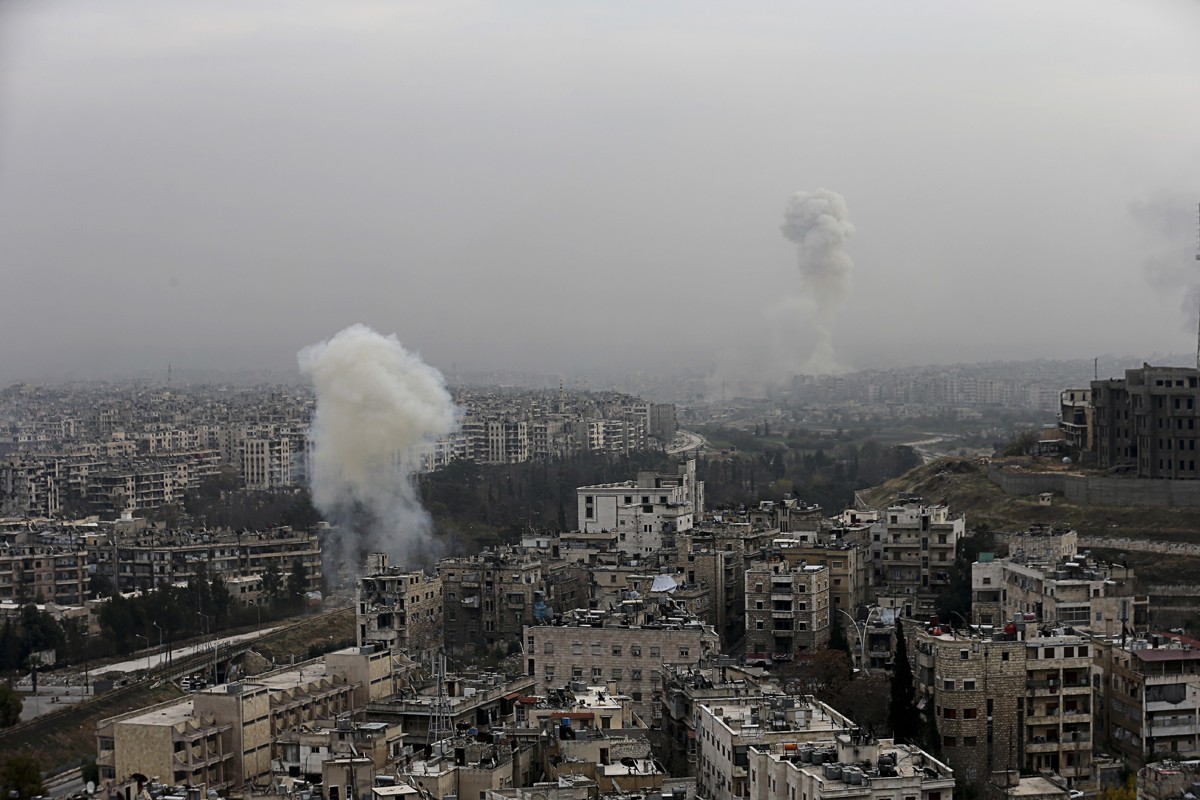Popular Reads
Top Results
Can't find what you're looking for?
View all search resultsPopular Reads
Top Results
Can't find what you're looking for?
View all search resultsUN resolution could sanction Syrians for chemical attacks
Change text size
Gift Premium Articles
to Anyone
 In ruins -- Smokes rise in east and west neighborhoods during a battle between forces loyal to Syrian President Bashar Assad and rebels in Aleppo, Syria, on Dec.5. The government seized large swaths of the Aleppo enclave under rebel control since 2012 in the offensive that began last week. The fighting was most intense Monday near the dividing line between east and west Aleppo as government and allied troops push their way from the eastern flank, reaching within less than a kilometer, about half a mile, from the citadel that anchors the center of the city. (AP/Hassan Ammar)
In ruins -- Smokes rise in east and west neighborhoods during a battle between forces loyal to Syrian President Bashar Assad and rebels in Aleppo, Syria, on Dec.5. The government seized large swaths of the Aleppo enclave under rebel control since 2012 in the offensive that began last week. The fighting was most intense Monday near the dividing line between east and west Aleppo as government and allied troops push their way from the eastern flank, reaching within less than a kilometer, about half a mile, from the citadel that anchors the center of the city. (AP/Hassan Ammar)
A
draft UN resolution obtained Tuesday by The Associated Press would impose sanctions on 11 Syrians and 10 Syrian organizations and companies allegedly involved in chemical weapons attacks in the war-ravaged country.
The proposed Security Council resolution, drafted by Britain and France, would also ban all countries from supplying Syria's government with helicopters, which investigators have determined were used in chemical attacks.
The resolution follows a joint investigation by the United Nations and the international chemical weapons watchdog that determined the Syrian government was behind at least three attacks involving chlorine gas and the Islamic State group was responsible for at least one involving mustard gas.
The United States, Britain and France have been pressing the council to impose sanctions on the Syrian government for using chemical weapons. Previous council resolutions call for "measures" under Chapter 7 of the UN Charter, which authorizes sanctions, if chemical weapons are used.
But Russia, Syria's closest ally, has repeatedly questioned the conclusions linking chemical weapons use to the regime of President Bashar Assad reached by the Organization for the Prohibition of Chemical Weapons-United Nations Joint Investigative Mechanism, known as the JIM.
The Syrian government denies using chemical weapons in the civil war, now in its sixth year. A Russian veto of the resolution is therefore highly likely when it is put to a vote, which diplomats say could be before the end of the year.
In addition to sanctions, the draft resolution would express the Security Council's "strong conviction that those individuals responsible for the use of chemical weapons in the Syrian Arab Republic should be thoroughly investigated, and prosecuted, as appropriate, before a competent tribunal which is both independent and impartial."
The 11 Syrians who would be subject to an asset freeze and travel ban under the draft resolution include Amr Armanzi, director-general of Syria's Scientific Studies Research Center, which is responsible for the development and production of chemical weapons and the missiles to deliver them in the country. Nine current and former military officers and the managing director of a Ministry of Defense subsidiary that assists in the production of chemical weapons are also named.
The 10 "entities" that would be put on the sanctions blacklist and subject to an asset freeze under the draft resolution include the Scientific Studies Research Center and several government subsidiaries, proxies, front companies and factories allegedly involved in producing chemical weapons.
A chemical weapon attack on a Damascus suburb that killed hundreds of civilians on Aug. 21, 2013, led to a US-Russian agreement and a Security Council resolution the following month that ordered the destruction of Syria's chemical weapons, precursors and the equipment to produce the deadly agents.
The Syrian government's support for the resolution and decision to join the chemical weapons watchdog known as the OPCW warded off possible US military strikes in response to the attack, which Damascus denied carrying out.
Syria's declared stockpile of 1,300 metric tons of chemicals has been destroyed, but the OPCW is still investigating outstanding questions about possible undeclared chemical weapons.
The draft resolution expresses "grave concern" that the OPCW "is not able to resolve all identified gaps, inconsistencies and discrepancies in Syria's declaration" and orders Syria to give a full declaration within 30 days of its adoption. (**)









